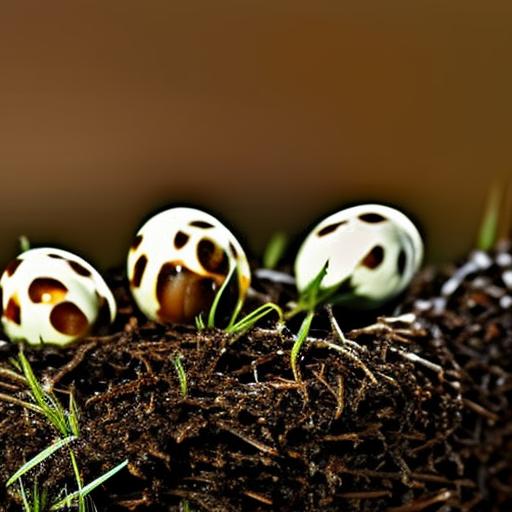Quail eggs are small, speckled eggs that come from the quail bird, a small game bird that is native to Europe, Asia, and Africa. These eggs are considered a delicacy in many parts of the world and are known for their rich, creamy flavor and high nutritional value. Quail eggs are packed with essential nutrients such as protein, vitamins, and minerals, making them a popular choice for health-conscious consumers. They are also a great alternative for those who have allergies to chicken eggs, as they are less likely to cause allergic reactions. Quail eggs can be enjoyed in a variety of ways, including boiled, fried, pickled, or used in baking and cooking. Their small size and delicate flavor make them a versatile ingredient that can add a unique touch to any dish.
Quail eggs are often praised for their health benefits, as they are high in protein and contain essential vitamins and minerals such as vitamin B12, riboflavin, and selenium. They are also lower in cholesterol and saturated fat compared to chicken eggs, making them a heart-healthy option for those looking to improve their diet. Quail eggs are also known for their high levels of antioxidants, which can help protect the body from oxidative stress and reduce the risk of chronic diseases. Additionally, quail eggs are a good source of choline, a nutrient that is important for brain health and development. With their impressive nutritional profile and unique flavor, quail eggs have become a popular choice for health-conscious consumers and food enthusiasts alike.
Key Takeaways
- Quail eggs are small, nutritious, and versatile, with a unique flavor and texture.
- Store quail eggs in a cool, dry place away from direct sunlight and strong odors.
- Refrigerate quail eggs to extend their shelf life and maintain freshness.
- Quail eggs can be frozen for up to 12 months, but should be cracked and beaten before freezing.
- The shelf life of quail eggs is approximately 5-6 weeks when refrigerated.
- Signs of spoilage in quail eggs include a foul odor, discoloration, and changes in texture.
- Proper storage and handling of quail eggs are essential for maintaining their quality and safety.
Storing Quail Eggs
Storing quail eggs properly is essential to maintain their freshness and quality. Whether you have a small batch of quail eggs from your backyard flock or a larger quantity from the market, it’s important to store them correctly to ensure they stay fresh for as long as possible. When storing quail eggs, it’s important to keep them at a consistent temperature and protect them from moisture and odors that can affect their quality. Proper storage can help extend the shelf life of quail eggs and ensure that they remain safe to eat.
One of the best ways to store quail eggs is in their original carton, which is designed to protect the eggs from damage and help maintain their freshness. The carton should be placed in the refrigerator as soon as possible to keep the eggs at a consistent temperature. It’s important to store quail eggs in the main part of the refrigerator, rather than in the door where temperatures can fluctuate. If you don’t have the original carton, you can also store quail eggs in a clean, dry container with a lid to protect them from moisture and odors. It’s important to handle quail eggs with care when storing them to prevent cracking or damage to the delicate shells. By following these storage guidelines, you can help ensure that your quail eggs stay fresh and safe to eat.
Refrigerating Quail Eggs
Refrigerating quail eggs is one of the best ways to keep them fresh and safe to eat. Quail eggs should be refrigerated at a consistent temperature of around 45°F (7°C) to help maintain their quality. When refrigerating quail eggs, it’s important to keep them in their original carton or in a clean, dry container with a lid to protect them from moisture and odors. It’s also important to store quail eggs in the main part of the refrigerator, rather than in the door where temperatures can fluctuate. By following these guidelines, you can help ensure that your quail eggs stay fresh and safe to eat for as long as possible.
Refrigerating quail eggs can help slow down the growth of bacteria and reduce the risk of spoilage. When stored at the proper temperature, quail eggs can remain fresh for up to 5 weeks. It’s important to check the expiration date on the carton and use the oldest eggs first to ensure that they are consumed before they spoil. Additionally, it’s important to handle quail eggs with care when refrigerating them to prevent cracking or damage to the delicate shells. By following these refrigeration guidelines, you can help ensure that your quail eggs stay fresh and safe to eat.
Freezing Quail Eggs
Freezing quail eggs is a great way to extend their shelf life and ensure that they can be enjoyed for longer periods of time. Whether you have an abundance of quail eggs from your flock or want to stock up on this delicacy when it’s in season, freezing is an excellent option for preserving their freshness. When freezing quail eggs, it’s important to crack them open and beat them lightly before transferring them into an airtight container or freezer bag. This will help prevent the yolks from becoming too gelatinous and make it easier to use the eggs in cooking and baking.
It’s important to label the container with the date of freezing to keep track of their freshness and use them within 3 months for the best quality. When thawing frozen quail eggs, it’s best to place them in the refrigerator overnight or under cold running water for quicker thawing. It’s important to use frozen quail eggs within 24 hours after thawing and not refreeze them once they have been thawed. By following these freezing guidelines, you can help ensure that your quail eggs remain fresh and safe to eat for longer periods of time.
Shelf Life of Quail Eggs
The shelf life of quail eggs can vary depending on how they are stored and handled. When stored properly in the refrigerator at a consistent temperature of around 45°F (7°C), quail eggs can remain fresh for up to 5 weeks. It’s important to check the expiration date on the carton and use the oldest eggs first to ensure that they are consumed before they spoil. Additionally, it’s important to handle quail eggs with care when storing them to prevent cracking or damage to the delicate shells.
When frozen at 0°F (-18°C) or below, quail eggs can remain safe to eat for up to 3 months. It’s important to label the container with the date of freezing and use them within 3 months for the best quality. When thawing frozen quail eggs, it’s best to place them in the refrigerator overnight or under cold running water for quicker thawing. It’s important to use frozen quail eggs within 24 hours after thawing and not refreeze them once they have been thawed. By following these guidelines for refrigerating and freezing quail eggs, you can help ensure that they remain fresh and safe to eat for longer periods of time.
Signs of Spoilage

It’s important to be able to recognize the signs of spoilage in quail eggs to ensure that they are safe to eat. When inspecting quail eggs, it’s important to look for any cracks or damage to the shells, as this can increase the risk of bacterial contamination. Additionally, spoiled quail eggs may have an off-putting odor or appearance, such as a cloudy or discolored yolk or white. If you notice any of these signs, it’s best to discard the eggs to avoid the risk of foodborne illness.
Another way to check if quail eggs are still fresh is by performing a float test. Simply fill a bowl with water and gently place the eggs in it. Fresh quail eggs will sink and lay flat on their sides, while older eggs will stand upright or float due to air pockets that develop over time. If any of the eggs float, it’s best to discard them as they may no longer be safe to eat. By being able to recognize these signs of spoilage, you can help ensure that you are consuming fresh and safe-to-eat quail eggs.
In conclusion, quail eggs are a nutritious and versatile ingredient that can add a unique touch to any dish. Whether you enjoy them boiled, fried, pickled, or used in baking and cooking, it’s important to store them properly to maintain their freshness and quality. By refrigerating quail eggs at a consistent temperature and freezing them when necessary, you can extend their shelf life and ensure that they remain safe to eat for longer periods of time. It’s also important to be able to recognize the signs of spoilage in quail eggs to avoid the risk of foodborne illness. With their impressive nutritional profile and unique flavor, quail eggs have become a popular choice for health-conscious consumers and food enthusiasts alike.
Quail eggs are a delightful addition to any meal, but how long can you keep them for eating? If you’re interested in raising your own quail for eggs, you might also be considering converting a shed into a chicken coop. This article provides valuable insights and tips on how to repurpose a shed for your feathered friends. Creating a suitable coop is essential for the well-being of your quail or chickens, and it’s an important aspect to consider when embarking on your egg-raising journey.
FAQs
How long can you keep quail eggs for eating?
Quail eggs can be kept for up to 2 weeks if stored properly.
What is the best way to store quail eggs?
Quail eggs should be stored in the refrigerator at a temperature of around 45-50°F (7-10°C) in their original carton or in an airtight container.
Can quail eggs be frozen for long-term storage?
Yes, quail eggs can be frozen for long-term storage. They should be cracked into a container, beaten lightly, and then frozen. They can be kept in the freezer for up to 1 year.
How can you tell if quail eggs have gone bad?
You can tell if quail eggs have gone bad by performing the float test. If an egg floats in a bowl of water, it is no longer fresh and should be discarded.
Can quail eggs be eaten raw?
Yes, quail eggs can be eaten raw, but it is important to ensure that they are fresh and have been properly stored to reduce the risk of foodborne illness.
Meet Walter, the feathered-friend fanatic of Florida! Nestled in the sunshine state, Walter struts through life with his feathered companions, clucking his way to happiness. With a coop that’s fancier than a five-star hotel, he’s the Don Juan of the chicken world. When he’s not teaching his hens to do the cha-cha, you’ll find him in a heated debate with his prized rooster, Sir Clucks-a-Lot. Walter’s poultry passion is no yolk; he’s the sunny-side-up guy you never knew you needed in your flock of friends!







